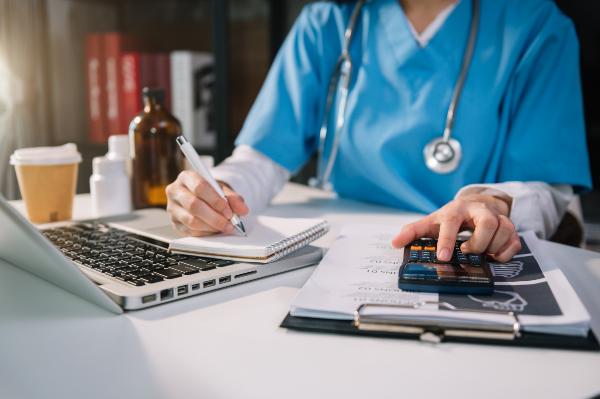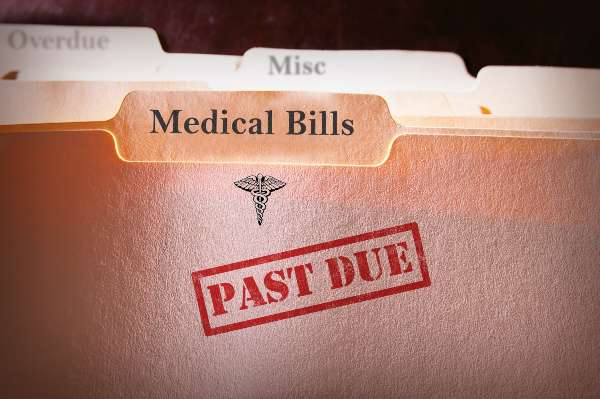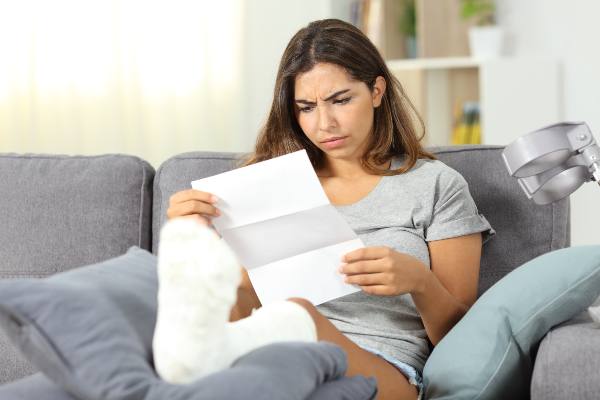A personal injury is a legal term for describing injuries to the body, mind, or emotions. It is different from property damage. It comes under tort law and is a civil lawsuit instituted by the person who suffers bodily injuries. Most personal injuries are from motor vehicle accidents, medical malpractice, workplace accident, defective products, e.t.c.
In any of the preceding, the victim needs medical treatment to get better. These treatments often lead to huge medical bills that the injured person might be unable to pay out of pocket. As personal injury lawyers at VG Law Group, we've seen many victims unaware of who should pay their medical bills. To this end, we will explain who pays for medical bills after a personal injury in Florida.

Medical care is very important following a traffic collision or any other form of accident. Without adequate treatment, the victim may not make a full recovery and return to life as they knew it. Most accident injuries become permanent injuries because the victims fail to get the help they need on time.
The one thing that prevents emergency medical care is the money to pay for the treatment. Most accident victims fail to realize they don't have to pay for their medical bills by themselves. This is why insurance companies exist and why people take out various policies.
Generally, when it comes to auto accidents that result in personal injury, the insurance company is the one that pays for medical bills. The insurer will pay as long the injured victim has an existing policy and pays the premium when due. On the other hand, a crash victim would pay if the fault driver does not have insurance coverage.
It means that ordinarily, the responsible party is the one who has to pay for the victim's treatment. Under Florida law, the recognized insurance coverage are:
Note that the insurance coverage that handles medical costs is distinct from the settlement sum victims get as compensation. The compensation encompasses money spent on treatment, emotional distress, and property damages. Insurance adjusters will consider the preceding when negotiating with your personal injury attorney.
If you have a motor vehicle, you must have this insurance policy. Florida law makes it compulsory for drivers to have PIP. This auto insurance policy covers medical bills following a crash. It applies to anyone with accident injuries, whether you are the injured victim or the fault party.
In other words, PIP is a no-fault medical bill coverage. If you have this medical payment coverage, your insurance carrier will cover up to 80% of your medical charges. The latter applies to bills up to $10,000.
PIP is primary coverage, meaning if you find yourself in need of urgent medical attention, it will handle the initial assessment bill. Afterward, if you need more medical assistance, you can look for other types of insurance. One thing to note about PIP is that it covers those not listed in the policy.
For instance, if you don't have PIP and get into an accident while traveling as a passenger, the driver will cover your treatment cost if they have a PIP policy. If a household member has PIP, you can use it to pay for medical treatments after an accident.
However, Personal Injury Protection insurance will not apply in these two instances:
Furthermore, PIP's goal is to reduce the bodily injury lawsuits from car accidents. It handles everything outside of permanent injuries or pain or suffering. This way, the injured party will not have to commence a personal injury lawsuit or hire accident lawyers.
The answer to this question is yes. While PIP will get you emergency medical care, it will not help if you have traumatic injuries. What you'll need at this point is bodily injury insurance coverage. Additionally, the auto insurance company will pay for the medical expenses under PIP if you get treated within 14 days of the auto accident.
Note that PIP will not pay for massage, acupuncture, or treatment from a chiropractic physician. Lastly, if you are not diagnosed with an emergency medical condition after an automobile accident, your PIP insurance provider will only pay $2,500 of your bills.
Med-Pay is another type of insurance that handles medical expenses after a motor vehicle crash. It is additional insurance coverage that covers medical payments that arise from the auto accident. It is quite similar to PIP but also differs from it.
Med-Pay covers 100% of all medical benefits to a certain amount. Conversely, PIP, as mentioned earlier, covers only 80%. Thus if you have $5,000 Med-Pay coverage and $10,000 PIP, you ultimately have $15,000 to cover medical payments.
Health insurance comes into play when you have used up your auto policy. The good thing about it is that the health insurance company will pay your medical bills timeously. When using this insurance coverage, ensure you keep track of what you pay your medical providers. Have a record of how much they received and the date they got the payment.
You will need this information at the end of your personal injury claim. This is because your insurance provider can place a lien on your settlement, and you have to ensure you're not cheated. It would be best to hand over payment receipts to your personal injury lawyer.
The attorney will negotiate with the health insurance company to remove the lien on your settlement and receive compensation instead. We should point out that there are instances where the medical provider will reject health insurance as payment. At other times, you may not have an active policy.
For the latter, you'll have to wait for your lawyer to get a fair settlement from your personal injury claim. During this time, you can try to get your physician to treat you using a letter of protection.
A letter of protection is a contract between a physician and a patient. The doctor agrees to provide medical services upfront. In exchange, you commit to paying their fees from your compensation benefits at your injury claim's conclusion.
Doctors who agree to this are taking a risk by hinging their payment on your compensation claim. It's like a contingency fee agreement between you and your personal injury lawyer. If your accident claim succeeds, the doctor gets paid.
The lawyer fails, the physician reserves the right to pursue the injured party for their payment. Note that the injured party's lawyer is the one who sends the letter of protection to the physician. However, most insurance attorneys frown against people getting treated with a letter of protection. But the reality remains that accident victims need help, and a letter of protection can be their only lifeline.

The first thing to note about bodily injury liability insurance is that it is fault coverage. It is the medical coverage taken out by the at-fault driver in an auto accident. A bad driver with this insurance coverage does not pay for the victim's injuries out-of-pocket. Their insurance provider will handle the medical bills.
Thus, a person buys BIL insurance coverage for when they get into a motor vehicle crash and are at fault. It covers reasonable expenses arising from the treatment of the injured party. Additionally, this coverage encompasses lost wages, pain and suffering, emotional distress, and other damages covered by personal injury claims.
Bodily injury coverage also covers both past and future medical treatments. However, insurance adjusters are always looking for ways to avoid paying the medical settlement sum. Often, they offer below what amounts to a fair settlement without consideration for future treatments.
This is why you have to hire experienced bodily injury insurance attorneys. The lawyer will represent you during negotiations with the insurance adjusters. They will ensure you get enough money to cover both past and future bills. If you need medical equipment to live a "normal" life, they will ensure you get it.
The thing about any required insurance coverage is that sometimes, they are not enough to cover the victim's losses. Not all drivers in Florida have enough bodily injury liability insurance coverage. Also, state laws do not require all drivers to have BIL, unlike PIP insurance.
The only people who must have bodily injury liability coverage are drivers with a DUI record. So, if it's not compulsory for drivers to have BIL insurance, and those who have do not have sufficient coverage, who pays for medical bills?
The answer is the victim through an uninsured motorist insurance coverage. It is full coverage that protects an injured person when the careless driver doesn't have BIL insurance. Victims can also use this as a partial payment when the BIL coverage exists but is insufficient.
Thus, a UMI is what you take for yourself, and you claim your insurance provider. So, how do you get your money back if you're the one paying for your treatment? Does the at-fault driver go free after causing you injuries?
The answer is no. If your UMI policy pays for your treatment, the next step is to file a personal injury lawsuit against the fault party. A personal injury lawyer will handle the claims process for you. Also, if your insurance company shy away from paying your claim, your attorney will aggressively pursue them until they do.
There are two kinds of personal injury victims. One is those who are patient enough to wait for their injury lawyer to conclude negotiations and get them the best settlement. The second are those who are impatient and accept whatever the insurance company offers them.
The second group of people's problem is that by accepting a personal injury settlement too soon, they shortchange themselves. They fail to consider future medical treatments and how they will pay for them. Examples of future medical costs are:
Once you accept a settlement sum without considering the above, that is the end of your claim. You can't come back in the future and try to get additional compensation. Thus, it would be best if you waited until you achieve Maximum Medical Improvement (MMI) before settling.
Also, it would help if you estimated the dollar value of future treatments, taking the following into account:
If you fail to do this, you will pay your medical bills yourself. In this case, your health insurance company will be the primary payment source. The money you get will be subject to the rules of health insurance claims. Hence, it will not cover chiropractic care and massage therapy. The only other source of help you would get will be from government benefits like Medicaid.

Injury accidents are usually unexpected and leave people scared and panicky. Getting treated should be easy. But it often isn't as making a payment is a condition precedent for most healthcare providers. Thus, instead of focusing on getting treated and recuperating, victims are worried about paying medical bills.
This is where we come in! At VG Law Group, we understand how difficult it is to get insurance companies to pay settlement claims. We also understand that at-fault parties don't always have the right coverage to cover medical bills. This is why our personal injury attorneys are aggressive in dealing with insurance providers and fault parties.
Our lawyers have experience getting the faulty party and insurers to pay medical bills for Florida victims. Our approach puts your needs first, and we focus on helping you achieve your goals. We will represent you on a contingency basis, meaning you don't pay us until we win. Schedule a free consultation with us today to get started on your case.